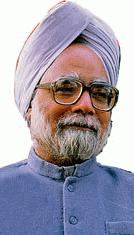|
Commentary / Mani Shankar Aiyar
The one Congressman who carries conviction as a man of ideas and a man of integrity
 Months later, the securities and banking scam broke. I spent 18
agonised months watching even some of my party colleagues collaborating
in a wholly unjustified endeavour to besmirch the reputation of
a good man and true.
Months later, the securities and banking scam broke. I spent 18
agonised months watching even some of my party colleagues collaborating
in a wholly unjustified endeavour to besmirch the reputation of
a good man and true.
We finally compromised on attributing certain
errors, some of a pretty grave nature, to the ministry rather than
the minister, specifically because all of these systemic errors
had their origin long before the Manmohan era and had persisted
and got aggravated only because Manmohan's predecessors had not
ironed out the wrinkles in the system when they should have.
It was Manmohan who did not buy our carefully worked out compromise.
He insisted on defining ministry as minister and promptly put
in his papers. The outcry against his resignation came not from
within the ranks of the Congress party but from the general public.
It was the people of India who refused to put a construction on
the JPC's findings that would allow Manmohan to actually relinquish
charge.
I thought Manmohan had been saved by the bell by the Opposition
walking out of the House on the last day of the winter session
of 1993 even as Manmohan was giving his explanations; they would,
I thought, be back at the barricades when the next Budget session
was convened. I was wrong.
The absence of any public backing to
the Opposition on Manmohan halted the Opposition in their tracks.
It was public confidence that stopped the political system from
making a needless scapegoat of its most able - and honest - public
servant.
 It has been argued - most vociferously by Monu Nalapat in The Times
of India - that Manmohan is in fact a political liability, not
an asset, because his economic policies failed to catch the imagination
of the voter and, therefore,
contributed in abundant measure to the collapse of the Congress
from a near majority in the Tenth Lok Sabha to a hopeless second
position in the elections that followed. There is an important
sense in which I agree with Monu Nalapat - although for reasons
diametrically opposite to the ones he gives.
It has been argued - most vociferously by Monu Nalapat in The Times
of India - that Manmohan is in fact a political liability, not
an asset, because his economic policies failed to catch the imagination
of the voter and, therefore,
contributed in abundant measure to the collapse of the Congress
from a near majority in the Tenth Lok Sabha to a hopeless second
position in the elections that followed. There is an important
sense in which I agree with Monu Nalapat - although for reasons
diametrically opposite to the ones he gives.
It was a grave mistake,
in my view, to have changed the idiom of economic expression,
dropping, for example, the word socialism from our political vocabulary
and going along with the claim of having instituted a new economic
policy when, in fact, the logic of the Rao-Manmohan revolution
was written into the strategy of the socialistic pattern of society
at Avadi 1955.
The fact is, as Nalapat points out, that the ecstasy
on Wall Street did not translate into votes in the Indian ballot-box
for the good reason that no one who works out of Wall Street votes
in an Indian election.
Where Nalapat, however, errs in in assuming that the election
of 1996 were a referendum on economic policy. I wish that had
been so; I wish the Congress had made it so. In fact, it was a tangle of issues - many of a regional nature - that overlook the electorate. If there was an overarching issues it was the issue of probity in public life. The Congress was able to put up only Manmohan in its defence, the party leadership had already tainted the party's image over hawala.
All that remained was for the Opposition to tot up the own-goals scored by the Rao
government against itself. A Congress with its reputation stained by itself was not a Congress that could emerge on top in the last scheduled general election of the 20th century.
 The clowning of the 14-headed hydra now in charge of the nation's
destiny makes it, however, clear that the election of 1996 are
not, in fact, going to be the last election of the 20th century.
Another time of testing will soon be upon us. And if the Congress
is to re-emerge as a force of nationwide significance, which
it has been for over a hundred years, it will have to do two things
which, in this very column, I have been stressing in recent months
- one, give itself a distinguishing and distinguishable ideological
profile, with a programme of action and a plan of implementation;
two, emerge from the shadows as a party of integrity.
The clowning of the 14-headed hydra now in charge of the nation's
destiny makes it, however, clear that the election of 1996 are
not, in fact, going to be the last election of the 20th century.
Another time of testing will soon be upon us. And if the Congress
is to re-emerge as a force of nationwide significance, which
it has been for over a hundred years, it will have to do two things
which, in this very column, I have been stressing in recent months
- one, give itself a distinguishing and distinguishable ideological
profile, with a programme of action and a plan of implementation;
two, emerge from the shadows as a party of integrity.
In a classic
example of killing two birds with one stone, Congress president
Sitaram Kesri has vested both responsibilities in the one Congressman
who can carry conviction as a man of ideas and a man of integrity.
In that lies the Importance of Being Manmohan.
|





 Months later, the securities and banking scam broke. I spent 18
agonised months watching even some of my party colleagues collaborating
in a wholly unjustified endeavour to besmirch the reputation of
a good man and true.
Months later, the securities and banking scam broke. I spent 18
agonised months watching even some of my party colleagues collaborating
in a wholly unjustified endeavour to besmirch the reputation of
a good man and true.
 It has been argued - most vociferously by Monu Nalapat in The Times
of India - that Manmohan is in fact a political liability, not
an asset, because his economic policies failed to catch the imagination
of the voter and, therefore,
contributed in abundant measure to the collapse of the Congress
from a near majority in the Tenth Lok Sabha to a hopeless second
position in the elections that followed. There is an important
sense in which I agree with Monu Nalapat - although for reasons
diametrically opposite to the ones he gives.
It has been argued - most vociferously by Monu Nalapat in The Times
of India - that Manmohan is in fact a political liability, not
an asset, because his economic policies failed to catch the imagination
of the voter and, therefore,
contributed in abundant measure to the collapse of the Congress
from a near majority in the Tenth Lok Sabha to a hopeless second
position in the elections that followed. There is an important
sense in which I agree with Monu Nalapat - although for reasons
diametrically opposite to the ones he gives.
 The clowning of the 14-headed hydra now in charge of the nation's
destiny makes it, however, clear that the election of 1996 are
not, in fact, going to be the last election of the 20th century.
Another time of testing will soon be upon us. And if the Congress
is to re-emerge as a force of nationwide significance, which
it has been for over a hundred years, it will have to do two things
which, in this very column, I have been stressing in recent months
- one, give itself a distinguishing and distinguishable ideological
profile, with a programme of action and a plan of implementation;
two, emerge from the shadows as a party of integrity.
The clowning of the 14-headed hydra now in charge of the nation's
destiny makes it, however, clear that the election of 1996 are
not, in fact, going to be the last election of the 20th century.
Another time of testing will soon be upon us. And if the Congress
is to re-emerge as a force of nationwide significance, which
it has been for over a hundred years, it will have to do two things
which, in this very column, I have been stressing in recent months
- one, give itself a distinguishing and distinguishable ideological
profile, with a programme of action and a plan of implementation;
two, emerge from the shadows as a party of integrity.